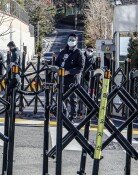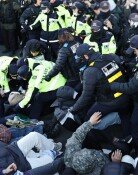Gen. Lee Beom-seok’s American brother: Lt. Clyde B. Sargent
Gen. Lee Beom-seok’s American brother: Lt. Clyde B. Sargent
Posted August. 19, 2023 08:24,
Updated August. 19, 2023 08:24
1953 marked the end of the Korean War. Soon after, a distinguished Korean figure journeyed across the seas to visit his friend of nine years junior, bearing a gift: a metal liquor flask adorned with a dragon and an owl. These symbols represented two old comrades – himself and his recipient. The inscription on it read, "From Lee Beom-seok to his American brother." The bearer was none other than Gen. Lee Beom-seok (1900-1972), South Korea's inaugural Prime Minister and Minister of Defense. The recipient was Clyde Bailey Sargent, a former lieutenant in the pivotal American Office of Strategic Services (OSS) (1909-1981). Gen. Lee was on a diplomatic journey to survey the state of affairs across the American continent when he met Sargent."
Thanks to the relentless research at the Independence Hall of Korea, spearheaded by its senior researcher Kim Do-hyeong, the tale of Lieutenant Colonel Sargent, the strategic mind behind the "Eagle Operation," comes to light.
Sargent's academic foray into Chinese studies culminated in a Ph.D. from Columbia University before the outbreak of the Sino-Japanese War. This intellectual pursuit led him to the corridors of a Chinese university, helming the Foreign Language Department. A significant influence on his career trajectory was his father, a geologist who meandered through China's vast terrains under the banner of the U.S. Geological Survey. By 1943, Sargent was recruited by the OSS. April of the following year, he was commissioned as a lieutenant in the U.S. Army.
The fates of these two military stalwarts converged in October 1944. A proposition from General Lee, then the vice head of the region in the Korean Liberation Army, sowed the seeds for a collaborative venture with the U.S. military, leading him to the doorsteps of the OSS. As a testimony to their growing camaraderie, Sargent found himself amid young, spirited Koreans - the brave souls who turned their backs on the Japanese Army to rally behind the Liberation Army. Their unwavering spirit, prowess, and unity were nothing short of extraordinary. Under the tutelage of the OSS, they stealthily penetrated the Korean Peninsula. This was the start of the espionage, sabotage, and laying the groundwork for the emblematic "Eagle Operation" – the bedrock of the Korea-U.S. alliance.
After the war, Sargent assisted Koreans returning from northern China, acted as an advisor to the U.S.-Soviet Joint Commission, and mediated between Korean politicians and Americans. He retired in 1948 and returned to the U.S., passing away on July 27, 1981. Reflecting on his bond with Korea, he stated it was "a significant experience in my lifetime." His son, Robert Sargent, mentioned in an interview facilitated by the Independence Hall of Korea last year, "It is a family's pride that my father contributed to the victory of allied Korea during World War II."
Gen. Lee and Lt. Sargent lived up to 72 and wrote memoirs a year before their respective passings. Although both the U.S. and China supported Korea's resistance against Japan, their memoirs present slightly different perspectives.
In Gen. Lee's memoir, he acknowledges the substantial support Korea’s provisional government received from the Chinese Nationalist Government, tracing back to the days of the Hongkew Park movement. However, this relationship was not without its difficulties. General Lee described feeling the 'sorrow of a guest army.' He noted, “The Chinese authorities often meddled in even minor personnel decisions, pressuring us with suggestions like appointing a Chinese as the chief of staff or a commissioner. Such proposals were often superficial agreements, leading to unnecessary complications.” (Excerpt from General Lee's memoir, "Bonfire")."
However, joint operations with the U.S. military were different. Lt. Sargent said, "The atmosphere of equality, respect, and cooperation forged by Lee Beom-seok and Sargent empowered an outstanding unit." If one glimpses the cultural differences between U.S. and Chinese hegemonies here, would that be an over-interpretation?







